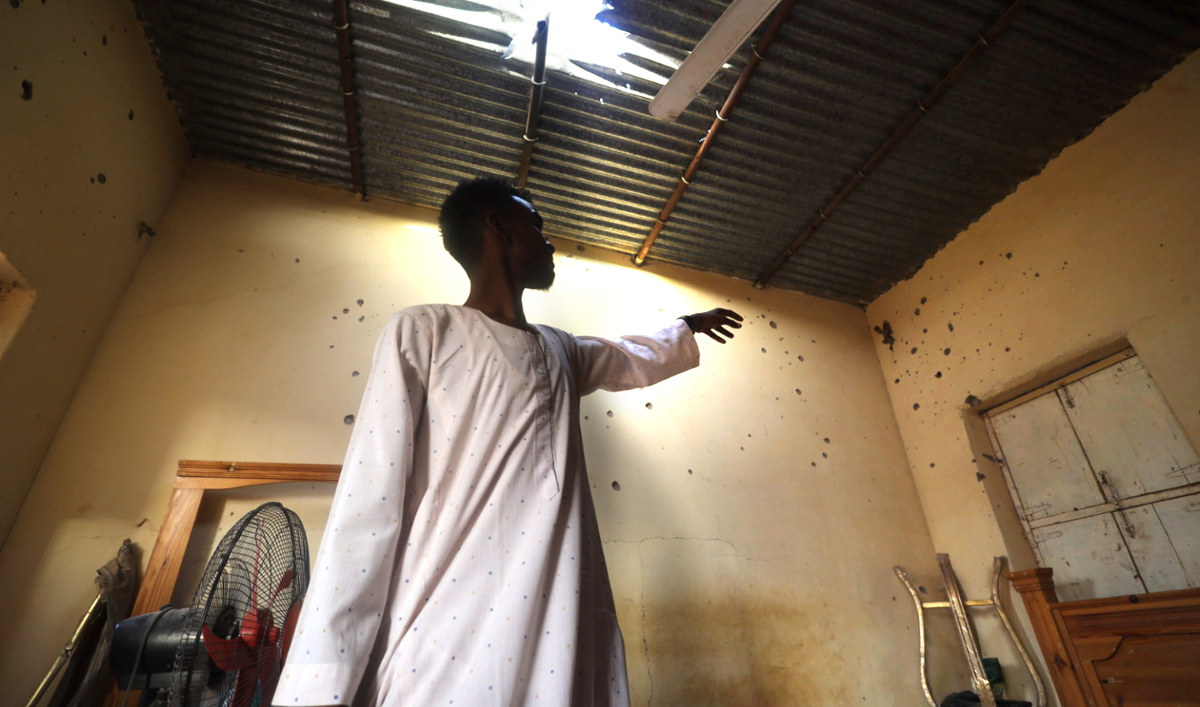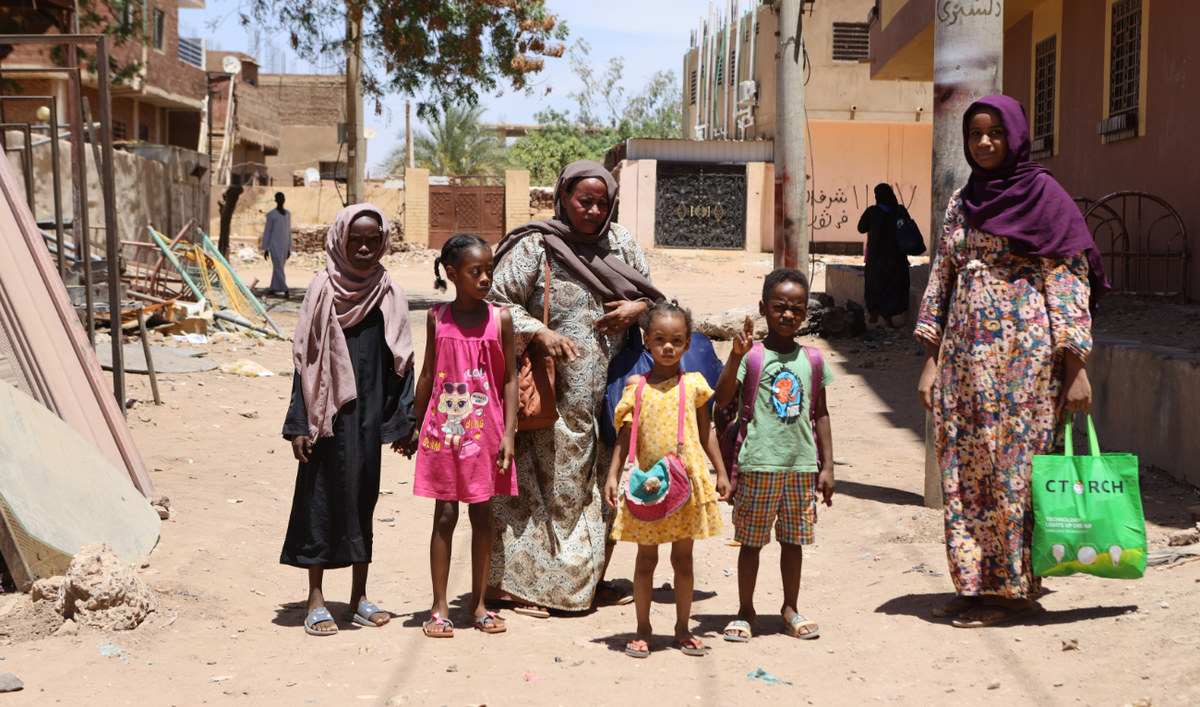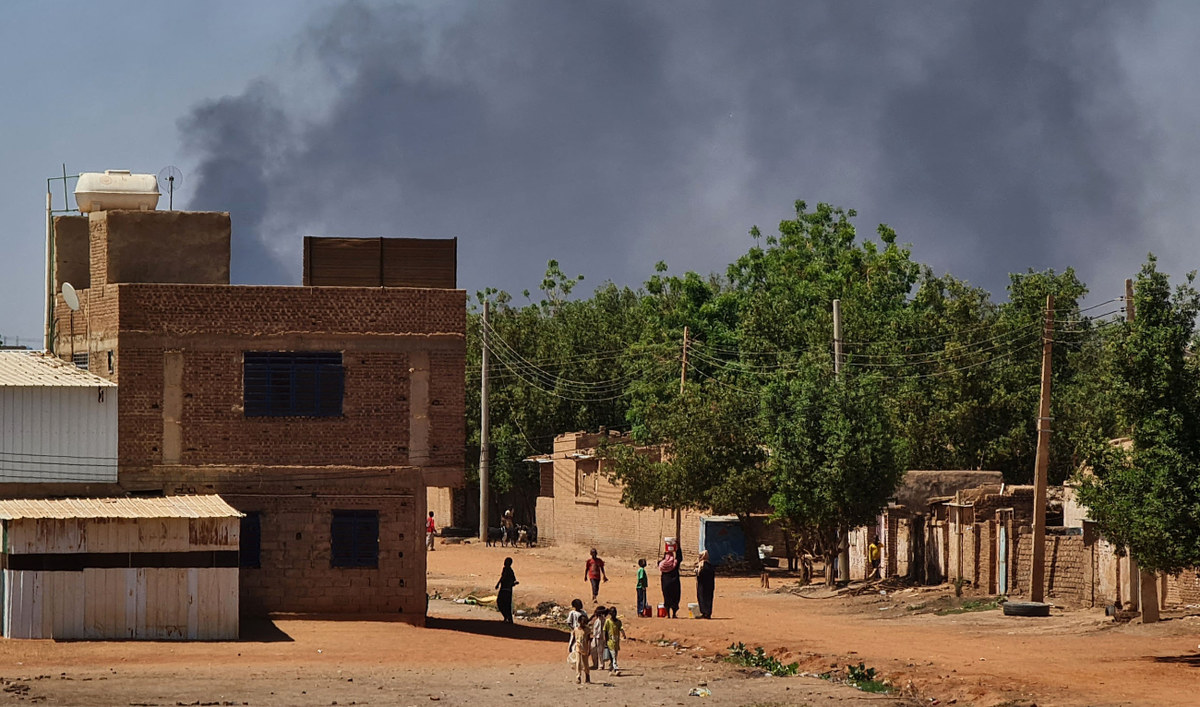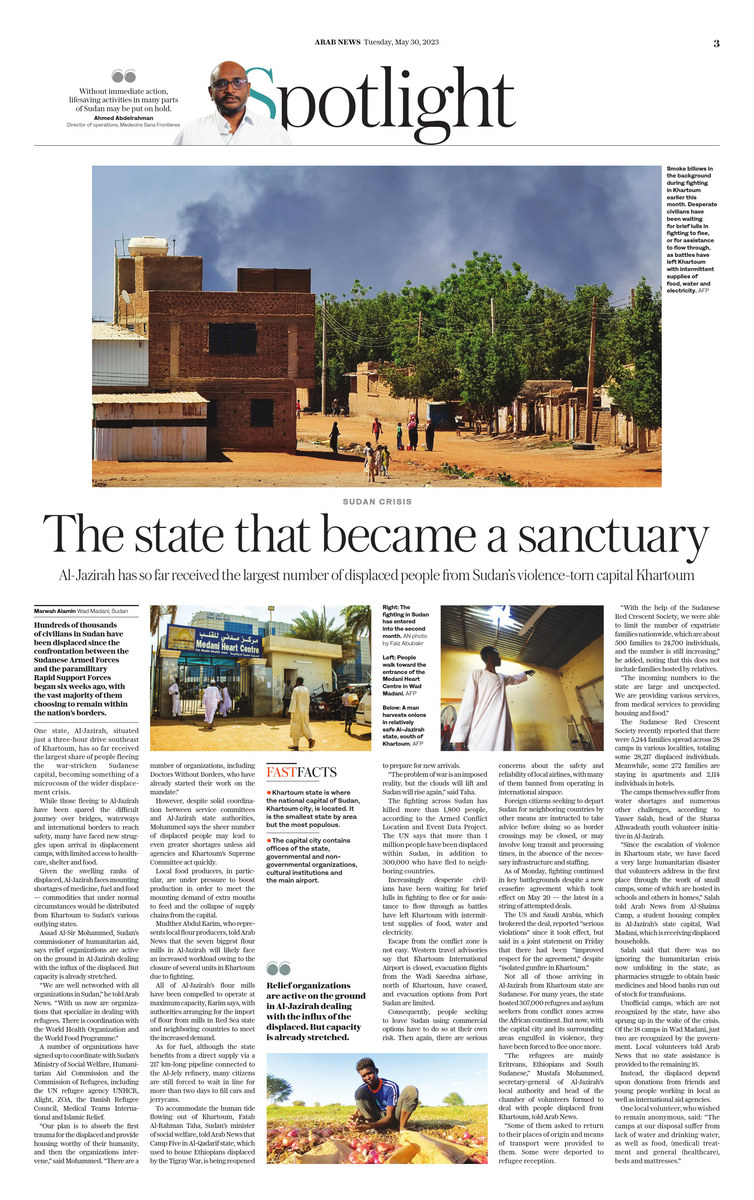WAD MADANI, Sudan: Hundreds of thousands of civilians in Sudan have been displaced since the confrontation between the Sudanese Armed Forces and the paramilitary Rapid Support Forces began six weeks ago, with the vast majority of them choosing to remain within the nation’s borders.
One state, Al-Jazirah, situated just a three-hour drive southeast of Khartoum, has so far received the largest share of people fleeing the war-stricken Sudanese capital, becoming something of a microcosm of the wider displacement crisis.
While those fleeing to Al-Jazirah have been spared the difficult journey over bridges, waterways and international borders to reach safety, many have faced new struggles upon arrival in displacement camps, with limited access to healthcare, shelter and food.
Given the swelling ranks of displaced, Al-Jazirah faces mounting shortages of medicine, fuel and food — commodities that under normal circumstances would be distributed from Khartoum to Sudan’s various outlying states.

Smoke billows in southern Khartoum amid ongoing fighting between the forces of two rival generals in Sudan on May 6, 2023. (AFP)
Asaad Al-Sir Mohammed, Sudan’s commissioner of humanitarian aid, says relief organizations are active on the ground in Al-Jazirah dealing with the influx of the displaced. But capacity is already stretched.
“We are well networked with all organizations in Sudan,” he told Arab News. “With us now are organizations that specialize in dealing with refugees. There is coordination with the World Health Organization and the World Food Programme.”
A number of organizations have signed up to coordinate with Sudan’s Ministry of Social Welfare, Humanitarian Aid Commission and the Commission of Refugees, including the UN refugee agency UNHCR, Alight, ZOA, the Danish Refugee Council, Medical Teams International and Islamic Relief.
“Our plan is to absorb the first trauma for the displaced and provide housing worthy of their humanity, and then the organizations intervene,” said Mohammed. “There are a number of organizations, including Doctors Without Borders, who have already started their work on the mandate.”

A patient is transported on a gurney at the Medani Heart Centre hospital in Wad Madani, the capital of the Al-Jazirah state in east-central Sudan, on May 25, 2023. (AFP)
However, despite solid coordination between service committees and Al-Jazirah state authorities, Mohammed says the sheer number of displaced people may lead to even greater shortages unless aid agencies and Khartoum’s Supreme Committee act quickly.
Local food producers, in particular, are under pressure to boost production in order to meet the mounting demand of extra mouths to feed and the collapse of supply chains from the capital.
Mudther Abdul Karim, who represents local flour producers, told Arab News that the seven biggest flour mills in Al-Jazirah will likely face an increased workload owing to the closure of several units in Khartoum due to fighting.
All of Al-Jazirah’s flour mills have been compelled to operate at maximum capacity, Karim says, with authorities arranging for the import of flour from mills in Red Sea state and neighboring countries to meet the increased demand.

A Sudanese man harvests onions in the region of Jazirah, south of Khartoum, on May 11, 2023. As fighting in Khartoum shows no signs of abating, small business owners have been left at a loss with no prospect of making up weeks of unmitigated downturn. (AFP)
As for fuel, although the state benefits from a direct supply via a 217 km-long pipeline connected to the Al-Jely refinery, many citizens are still forced to wait in line for more than two days to fill cars and jerrycans.
To accommodate the human tide flowing out of Khartoum, Fatah Al-Rahman Taha, Sudan’s minister of social welfare, told Arab News that Camp Five in Al-Qadarif state, which used to house Ethiopians displaced by the Tigray War, is being reopened to prepare for new arrivals.
“The problem of war is an imposed reality, but the clouds will lift and Sudan will rise again,” said Taha.

A man walks past a shuttered petrol station in Wad Madani, the capital of the Al-Jazirah state in east-central Sudan, on May 18, 2023. (AFP)
The fighting across Sudan has killed more than 1,800 people, according to the Armed Conflict Location and Event Data Project (ACLED). The UN says that more than 1 million people have been displaced within Sudan, in addition to 300,000 who have fled to neighboring countries.
Increasingly desperate civilians have been waiting for brief lulls in fighting to flee or for assistance to flow through as battles have left Khartoum with intermittent supplies of food, water and electricity.
Escape from the conflict zone is not easy. Western travel advisories say that Khartoum International Airport is closed, evacuation flights from the Wadi Saeedna airbase, north of Khartoum, have ceased, and evacuation options from Port Sudan are limited.
Consequently, people seeking to leave Sudan using commercial options have to do so at their own risk. Then again, there are serious concerns about the safety and reliability of local airlines, with many of them banned from operating in international airspace.
FASTFACT
- Khartoum state is where the national capital of Sudan, Khartoum city, is located. It is the smallest state by area but the most populous. The capital city contains offices of the state, governmental and non-governmental organizations, cultural institutions and the main airport.
Foreign citizens seeking to depart Sudan for neighboring countries by other means are instructed to take advice before doing so as border crossings may be closed, or may involve long transit and processing times, in the absence of the necessary infrastructure and staffing.
As of Monday, fighting continued in key battlegrounds despite a new ceasefire agreement which took effect on May 20 — the latest in a string of attempted deals.
Read more: Saudi, US mediators announce late Monday the ceasefire in Sudan will be extended for 5 days
The US and Saudi Arabia, which brokered the deal, reported “serious violations” since it took effect, but said in a joint statement on Friday that there had been “improved respect for the agreement,” despite “isolated gunfire in Khartoum.”

Sudanese have been suffering since the fighting began six weeks ago. (AN photo by Faiz Abubakr)
Not all of those arriving in Al-Jazirah from Khartoum state are Sudanese. For many years, the state hosted 307,000 refugees and asylum seekers from conflict zones across the African continent. But now, with the capital city and its surrounding areas engulfed in violence, they have been forced to flee once more.
“The refugees are mainly Eritreans, Ethiopians and South Sudanese,” Mustafa Mohammed, secretary-general of Al-Jazirah’s local authority and head of the chamber of volunteers formed to deal with people displaced from Khartoum, told Arab News.
“Some of them asked to return to their places of origin and means of transport were provided to them. Some were deported to refugee reception.
“With the help of the Sudanese Red Crescent Society, we were able to limit the number of expatriate families nationwide, which are about 500 families to 24,700 individuals, and the number is still increasing,” he added, noting that this does not include families hosted by relatives.
“The incoming numbers to the state are large and unexpected. We are providing various services, from medical services to providing housing and food.”

For many years, Al-Jazirah state hosted 307,000 refugees and asylum seekers from conflict zones across the African continent. (AN photo by Faiz Abubakr)
The Sudanese Red Crescent Society recently reported that there were 5,244 families spread across 28 camps in various localities, totaling some 28,217 displaced individuals. Meanwhile, some 272 families are staying in apartments and 2,114 individuals in hotels.
The camps themselves suffer from water shortages and numerous other challenges, according to Yasser Salah, head of the Sharaa Alhwadeath youth volunteer initiative in Al-Jazirah.
“Since the escalation of violence in Khartoum state, we have faced a very large humanitarian disaster that volunteers address in the first place through the work of small camps, some of which are hosted in schools and others in homes,” Salah told Arab News from Al-Shaima Camp, a student housing complex in Al-Jazirah’s state capital, Wad Madani, which is receiving displaced households.
Salah said that there was no ignoring the humanitarian crisis now unfolding in the state, as pharmacies struggle to obtain basic medicines and blood banks run out of stock for transfusions.
Unofficial camps, which are not recognized by the state, have also sprung up in the wake of the crisis. Of the 18 camps in Wad Madani, just two are recognized by the government. Local volunteers told Arab News that no state assistance is provided to the remaining 16.
Instead, the displaced depend upon donations from friends and young people working in local as well as international aid agencies.

People walk as smoke billows in the background during fighting in the Sudanese capital Khartoum, on May 3, 2023. (AFP)
One local volunteer, who wished to remain anonymous, said: “The camps at our disposal suffer from lack of water and drinking water, as well as food, (medical) treatment and general (healthcare), beds and mattresses.
“There is a lack of electricity and there are a large number of patients. Therefore, we host treatment days in the presence of doctors.”
Despite the lack of government support, the volunteer said that those housed in the unofficial community-supported camps are often better off than those in state-recognized camps.
“The condition of the camps under the control of the government is worse than in the camps we operate, which are based on the principles of humanism and contribution.”

















